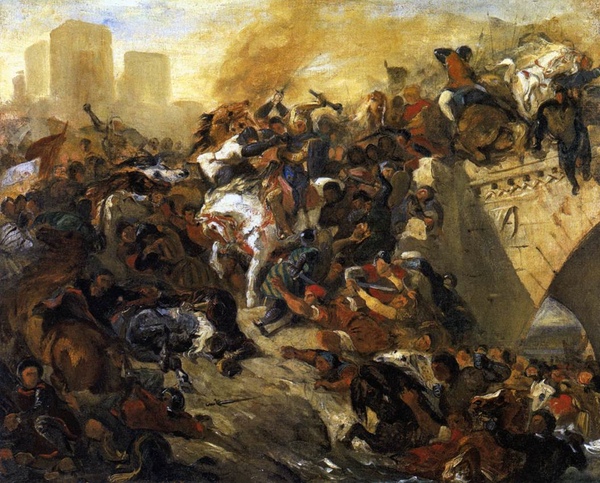
…
Yo, que estudié leyes y los cánones,
yo Francisco Narciso de Laprida,
cuya voz declaró la independencia
de estas crueles provincias, derrotado,
de sangre y de sudor manchado el rostro,
sin esperanza ni temor, perdido
huyo hacia el sur por arrabales últimos.
Como aquel capitan de Purgatorio
que huyendo a pie y ensangrentando el llano,
fue cegado y tumbado por la muerte
donde un oscuro río pierde el nombre,
así habré de caer. Hoy es el término.
La noche lateral de los pantanos
me acecha y me demora.
….
A esta ruinosa tarde me llevaba
el laberinto múltiple de pasos
que mis días tejieron desde un día
de la niñez. Al fin me he descubierto
la recóndita clave de mis años,
la suerte de Francisco de Laprida,
la letra que faltaba, la perfecta
forma que supo Dios desde el principio.
En el espejo de esta noche alcanzo
mi insospechado rostro eterno. El círculo
se va a cerrar. Yo aguardo que así sea.
Pisan mis pies la sombra de las lanzas
que me buscan. Las befas de mi muerte,
los jinetes, las crines, los caballos,
se ciernen sobre mí… Ya el primer golpe
ya el duro hierro que me raja el pecho,
el íntimo cuchillo en la garganta.
—Jorge Luis Borges, excerpts from Poema conjetural, first published in La Nación (Buenos Aires), July 4, 1943.
Read an English translation by Anthony Kerrigan here
Listen to Borges read the poem here
Lawyers can be dishonest, venal and self-serving. Lawyers can be intoxicated by power and can do evil to achieve it. But lawyers can be heroes, though sometimes tragic ones, whose vision provides inspiration across the ages. Consider this amazing poem by Borges, a salute to his ancestor, Francisco Narciso de Laprida, a lawyer who struggled to bring democratic liberalism anchored in the rule of law to the southern cone of Latin America. His idea of enlightened democratic governance was choked by repressive countercurrents, and he fell in a skirmish with reactionary forces on September 22, 1829. In this powerful but dark work, Borges records the last minutes of his life, and his spirit of defiance even as life slips from his body. Borges was descended from some of the first families of South America, from proud Spanish soldiers who bent a continent to their will with much bloodshed and violence. But Borges thinks nothing of those ancestors; he seems almost embarrassed by the connection. Instead it is the liberal leaders of Buenos Aires in the first half of the nineteenth century whose memory he safeguards. He writes these lines in the days in which Argentina is slipping into a Peronist dictatorship, and his attitude of quiet but spirited defiance would have been inescapable to Argentine readers of poems like this one. (Clive James, writing in Slate faults Borges for not having done more to protest Argentina’s bloody dictatorships. There is certainly something to James’s criticism. On the other hand, perhaps James is deaf to Borges’s very potent dissenting voice, presented as an artistic vision, redolent with irony and humor.) Borges’s poem also bears interesting parallels with Rainer Maria Rilke’s Die Weise von Liebe und Tod des Cornets Christoph Rilke, in which a military ancestor is similarly presented in the last days of his life and death. Both works have a haunting sense of genetic connection, fate and historical cycle, as if the ancestor’s lifetime experiences were destined to echo in his progeny. As a poetic device, the idea can be very effective, and certainly Borges has made good use of it, with language that enchants and jars simultaneously.
In the Fearful Sphere of Pascal, Borges writes that “it may be that universal history is the history of the different intonations given a handful of metaphors.” Consider Beethoven’s String Quartet no. 11 in F Minor, op. 95 (1812), the Quartetto serioso, as an exercise in this notion. Do you hear the rupture and dislocation of time that Borges has suggested can be found in this work?



